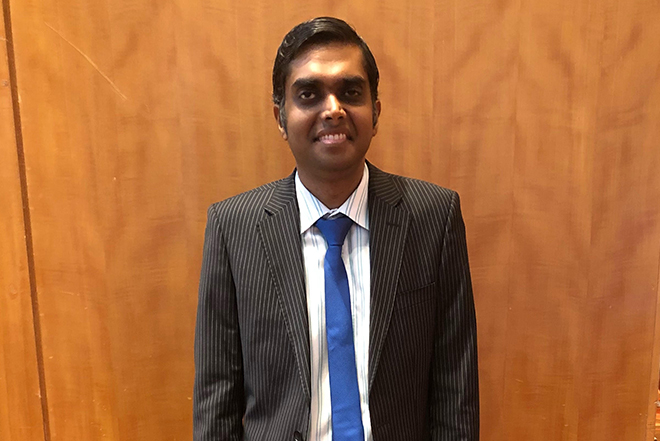
Vijay Pratap Rai, who was diagnosed with psychosis, became a successful peer support specialist as he realised that by sharing his own experiences he could touch other people’s lives, especially those with mental health conditions, instill hope and happiness in them crucial to recovery. This concludes his two-part narrative of inspiration.
After working in the Mental Health Industry for two years plus as a Peer Specialist with the Singapore Association for Mental Health (SAMH), my life came to a crossroad. Work was enjoyable at SAMH and I learnt a lot in my two years plus with them. SAMH was also a key part in my recovery. I have many fond memories of SAMH. However, I felt I needed a break and needed to consider my options moving forward. Hence, I resigned from SAMH.
Change of job
After my resignation and during my break, a job opportunity at the Institute of Mental Health (IMH) - Early Psychosis Intervention Program (EPIP) opened up for a Peer Support Specialist. Hence, to take the peer movement forward and for my own career development, as well as to test my own recovery, I decided to apply for the job even though I knew that it was going to be challenging. I have been helping out as a Peer Support Specialist at EPIP since 2012 and more regularly since 2014, mainly once a week. Therefore, I was well aware of the challenges and decided to give it a shot for my own development as I had learnt from my previous experience that growth lies in facing challenges.
My anxiety triggers
I secured the job which I also see as a vocation and started work in July 2016. I knew that transiting into a new job will be challenging and I mentally prepared myself for it before I started. True enough, a few days into the job I started to get very anxious. At the same time my brother was getting married and I was due for reservist which further increased my anxiety. There were all sorts of fears and things which were triggering my anxiety. I was worried that I will not make it through the probation period and I felt like giving up. I could clearly see that I had two options in front of me. One was the easier option of giving up and the other was to see this as a challenge as well as a learning opportunity. I knew that learning opportunities lies in difficulties.
Fortunately, due to past experience, I was aware that what I was experiencing was a phase and it will soon pass. Having dealt with such anxieties in the past also gave me some confidence that I can deal with it again. I had to use the recovery model which I learnt from Illness Management Recovery (IMR) at SAMH. I also used Individual Connection Empowerment Revitalisation (I-CPR) which I learnt from Emotional Connection Empowerment Revitalisation (E-CPR) at SAMH. I also knew I had to ask for help. Hence, I went for counselling at Insight Centre from SAMH which was very useful and I also went for psychotherapy. I kept my Reporting Officer (RO) (my supervisor) in the loop as well. The amazing supportive colleagues I have around me have been helpful as well. I saw this experience as a learning opportunity and improve my recovery further. I kept asking myself what the anxieties and triggers are trying to tell me and what I can learn from them. Slowly, I began to realise that there was nothing wrong with my anxieties and triggers. It was my body, mind’s way of slowly healing itself from past traumas and adjusting to a new work environment.
After a couple of months, all combined efforts of my social support system, which consists of medical team, counsellor, family, friends, fellow Peer Support Specialists (PSS), PSS Mentors, RO and colleagues from EPIP team, seem to bear fruits. My anxiety and triggers reduced dramatically to a negligible level. Although I still experience anxiety from time to time, it is much more manageable compared to when I first started work.
Positive shift
Upon reflection, I feel a sense of gratitude and thankfulness for my experiences. Initially, when I was diagnosed with a mental illness, struggling with anxiety, having all sorts of sufferings related to the illness, I saw no end to it and thought nothing good can come out of it. In fact, I was embarrassed of it and did not want to talk much about it. Surprisingly, now I realise that the seeds of success were hidden like jewels in the very suffering I despised. I believe the crisis of mental illness has turned me into a better person by positively shifting my perceptions on life.
For instance, it was through the suffering that I experienced the goodness and compassion of people from the community, who seemed like angels coming to guide me in the hour of need. There were negative people as well but I chose to surround myself with good, positive people and remember the goodness. I was fortunate as there was more positivity than negativity around me. In fact, in my journey I have seen negative people becoming more positive as they get to know and hear stories of people diagnosed with a mental health condition. It is also due to my experiences that I am able to share my story with fellow peers (people diagnosed with a mental health condition) and inspire them onto recovery almost like a gift. It is also due to my experiences together with the guidance of the community that lead me to the joy of serving as a Peer Support Specialist and taking it as a vocation.

In fact, dealing with a mental illness has become my anchor in a way. For example, whenever I am faced with a difficulty I tell myself that if I can deal with a mental illness I can definitely deal with that difficulty that faces me as well. Thanks to the experiences I am also thankful for the small things in life which I used to take for granted which I realise is more important than the big items such as the rising and setting of the sun, smell of flowers, leisurely walks, quality conversations we have with people, the small outings we have with our loved ones and sometimes by simply being present for our loved ones when needed. Hence, I feel thankful for my experiences.
The way forward
Looking ahead, I know life will still have its struggles and challenges. However, I am convinced that it will only turn me into a better person as long as I learn from them and I do not have to go through them alone as there is a community like a village to tap on to. I look ahead with a sense of adventure not knowing what life will throw at me but confident that it will all turn out well eventually. It is a well deserving perspective to take note off. I also look forward to creating a recovery culture in IMH as well as in Singapore with our various stakeholders.






